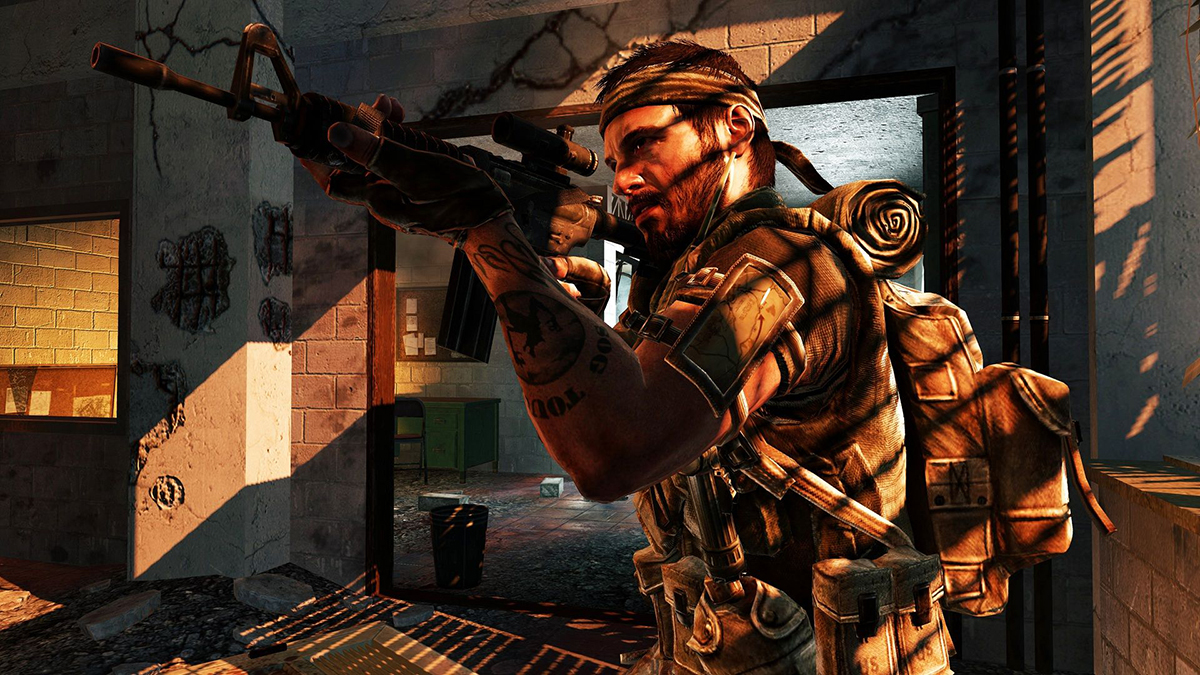Treyarch’s (now also Raven Software’s) Call of Duty: Black Ops series, now a major subfranchise of the larger CoD brand, has gradually become a fan-favorite despite its wobbly, story-less fourth entry. Ahead of Black Ops 6, I’ve been replaying the games chronologically, and I couldn’t help but laugh hysterically at most of the original Black Ops’ campaign.
I’ve stated in the past my relationship with Call of Duty as a whole is an odd one; by and large, it’s very much US military-backed propaganda, and most of its story beats and core premises (if you ever step out of the multiplayer side of things) are eyebrow-raising at best. On the other hand, they’re consistently well-produced blockbuster flicks in which you’re the one pulling the trigger, and this also applies to the MP. At the very least, the latest CoD will fill your belly and feel like a proper AAA release. You know what you’re getting each year, and the fact the mechanics have been refined over two decades helps seal the deal.
Spoilers ahead for Call of Duty: Black Ops’ story campaign.
Playing the Black Ops games in chronological order has only become more confusing over the years due to the larger franchise constantly switching the overall direction and shifting its priorities around. After Black Ops 6 launches, you’ll need to play BO1, then Cold War (technically BO5), move on to BO2, and after all that, finally hit BO6, which uses that number because it’ll probably help sell more copies. You could also move on to play the (underrated, IMO) third game in release order, but make sure to ignore BO4, which somehow takes place before BO3 and is just trash (the fact it was MP-only was the least of its problems).

You might have noticed this timeline is a mess after Cold War refused to start a new continuity and instead served as a direct sequel to BO1 before the ‘80s events depicted in BO2 (most of the game takes place in the distant future of… 2025) while also making a straight connection to the rebooted Modern Warfare timeline. The problem? Treyarch and Raven are saying BO2 is canon to BO6, which picks up after its ‘past’ sections. It makes nigh impossible to reconcile the current MW events with the second Black Ops’ take on 2025, so now we have to pretend only half of that game is canon.
This is all important to half-understand the Black Ops series’ complicated but admirable commitment to interconnected, non-linear narratives, which started with the first one all the way back in 2010. Call of Duty was at the height of its first golden era, as no other FPS series (not even Battlefield at its best) was achieving that degree of success both as single-player blockbusters nor competitive MP packages full of PvP and co-op modes, progression mechanics, and unlocks.
“The numbers, Mason. What do they mean?!” It’s hard to argue against Black Ops as perhaps the most iconic (or at least quotable) Call of Duty campaign of all time, since it certainly earns that honor from the get-go. It was unlike anything the franchise had tried before and, even today, feels – on a surface level – playful in a way its siblings simply aren’t. Is it good though? Eh, not really.

We can go back and forth all day about Call of Duty and its narrative merits, but looking back at two decades’ worth of “America, hell yeah” storylines and how they’ve impacted fans and the entire military FPS genre, we can’t deny there’s some good stuff in there. The production values are always top-notch, but more importantly, Call of Duty reasonably imitates well what has historically worked in war movies, and that includes creating sets of memorable characters.
In the case of Black Ops, Alex Mason and Frank Woods were at the center of the story, delightfully played by Sam Worthington and James C. Burns respectively. The actors understood the assignment of hamming it up as much as possible without losing the touch of self-seriousness that covers the entire thing. BO1 is Call of Duty at its goofiest, and what once seemed extremely cool… now feels like a parody of modern Call of Duty. In a way, replaying the older games reminds you the narrative quality has actually gone upward in recent times.
Plot-wise, I’m tempted to say it remains all killer, no filler. The jumpy and relentless pacing, added on top of the non-linear narrative structure, works in its favor a lot. It’s a rollercoaster ride through and through. It holds up as a top tier spectacle if you can get over the rusty bits that come with a 2010 shooter. So, what’s the issue? Well, even by CoD standards back in the day, it feels like fanfiction written by a teenager who picked up two history books about the Cold War and played tons of Modern Warfare.

The OG MW1 (2007) and MW2 (2009) were both criticized and praised for their commitment to fully realizing a ‘Michael Bay on crack’ vision of the franchise in a modern setting. On the other hand, World at War (2008) was meaner and tried to be more adult, which kind of worked almost automatically thanks to the WW2 setting. BO1 kept that Treyarch-led vision going, but when mixed with predictable needle drops and all-American hardasses doing all sorts of awful stuff to “protect America’s way of life” without ever second-guessing their part in the USA and the Soviet Union’s power plays and 3D chess game, the end result isn’t as cohesive once you grow up a little.
Sure, the big plot twist was neat, and Mason kind of rocks as a protagonist that’s gone through a lot for his country, but spy stories and thrillers are built on healthy amounts of nuance and carefully calculated tension. BO1 has none of that, constantly being every bit as puerile as its predecessors while desperately trying to cobble together a more complex story that people could take seriously. It hasn’t aged gracefully, and I was trying not to wake up the entire household with loud laughs when the main bad guy was dead, the Cuban Missile Crisis was averted, and the grim tone suddenly turned into a Fourth of July celebration in the middle of the sea. “It is over, we won,” Weaver says with a smile on his face as rock music kicks in and you get a US Navy money shot for no reason before we go back to conspiracy photos of JFK’s assassination.

Thankfully, Cold War fixed most of those problems, ‘updating’ the entire Cold War narrative to be slightly less USA-centric and adding much-needed nuance to the roster of characters and their relationship with the mysterious lead. It’s also the rare Call of Duty campaign that allowed itself to have proper downtimes and even add light role-playing elements to the tried-and-tested formula.
With Black Ops 6 now looming near, one has to wonder whether it’ll stick to that sweet balance or go back to the old ways to appease 30-somethings that refuse to grow up. I must admit I’m also worried about how it’ll incorporate story elements from BO2. On the other hand, it should be a fantastic product given its (very rare) four-year dev cycle. For better or worse, we’re back in black, baby.






Published: Oct 8, 2024 09:00 am